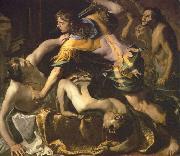La Peinture à l'huile en gros de Chine & Encadre |
|||||||||||

|
|||||||||||
|
|
|
||||||||||||||
|
Bernardino Mei
(1612/15 - 1676) worked in a Baroque manner in his native Siena and in Rome, finding patronage above all in the Chigi family. Briefly a pupil of the Sienese draughtsman and cartographer Giuliano Periccioli, where he learned the art of engraving, Bernardino passed to the studio of the painter Rutilio Manetti and probably also served in the workshop of Francesco Rustici. He painted in and around Siena, where his work came to the attention of Cardinal Fabio Chigi, who, once elected pope as Alexander VII (1655), called Bernardino Mei to Rome in 1657. There Bernardino came under the influences of Mattia Preti, Andrea Sacchi and Pier Francesco Mola, and of Guercino, to the extent that until the 20th century Bernardino's fresco of Aurora in Palazzo Bianchi Bandinelli was attributed to Guercino himself. Through the fast friendship that bonded him to Gian Lorenzo Bernini, whose studio he frequented, he applied that sculptor's sense of theatrical action to his own mythological and allegorical subjects. He died in Rome in 1676. |
||||||||||||||
|
|
||||||||||||||
|
||||||||||||||
|
|
||||||||||||||
| Bernardino Mei
(1612/15 - 1676) worked in a Baroque manner in his native Siena and in Rome, finding patronage above all in the Chigi family. Briefly a pupil of the Sienese draughtsman and cartographer Giuliano Periccioli, where he learned the art of engraving, Bernardino passed to the studio of the painter Rutilio Manetti and probably also served in the workshop of Francesco Rustici. He painted in and around Siena, where his work came to the attention of Cardinal Fabio Chigi, who, once elected pope as Alexander VII (1655), called Bernardino Mei to Rome in 1657. There Bernardino came under the influences of Mattia Preti, Andrea Sacchi and Pier Francesco Mola, and of Guercino, to the extent that until the 20th century Bernardino's fresco of Aurora in Palazzo Bianchi Bandinelli was attributed to Guercino himself. Through the fast friendship that bonded him to Gian Lorenzo Bernini, whose studio he frequented, he applied that sculptor's sense of theatrical action to his own mythological and allegorical subjects. He died in Rome in 1676. Orestes_slaying_Aegisthus_and_Clytemnestra Orestes slaying Aegisthus and Clytemnestra 1654(1654) Orestes slaying Aegisthus and Clytemnestra 1654(1654) |
||||||||||||||
|
Related Paintings to Bernardino Mei :. |
||||||||||||||
|
|
||||||||||||||
|
|
||||||||||||||
|
CONTACTER DES Etats-Unis |







